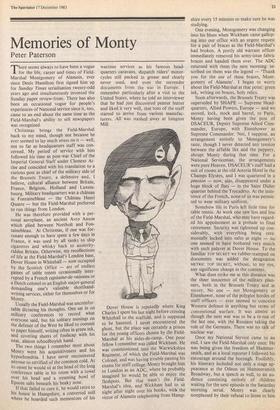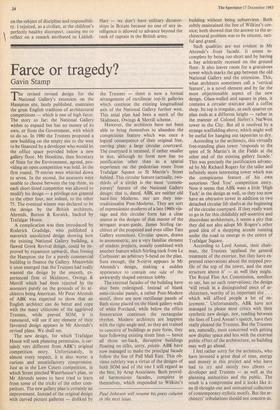Memories of Monty
Peter Paterson
There seems always to have been a vogue for the life, career and times of Field- Marshal Montgomery of Alamein, ever since Denis Hamilton first signed him up for Sunday Times serialisation twenty-odd years ago and simultaneously invented the Sunday paper review-front. There has also been an occasional vogue for people's experiences of National service since it, too, came to an end about the same time as the Field-Marshal's ability to sell newspapers was recognised.
Christmas brings the Field-Marshal. back to my mind, though not because he ever seemed to lay much stress on it — well, not so far as headquarters staff was con- cerned. My period of service with him followed his time as post-war Chief of the Imperial General Staff under Clement At- tlee and coincided with his translation to a curious post as chief of the military side of the Brussels Treaty, a defensive and, I believe, cultural alliance between Britain, France, Belgium, Holland and Luxem- bourg. Military headquarters was a château in Fontainebleau — the Château Henri Quatre — but the Field-Marshal preferred to run things from London.
He was therefore provided with a per- sonal aeroplane, an ancient Avro Anson which plied between Northolt and Fon- tainebleau. At Christmas, if one was for- tunate enough to have spent a few days in France, it was used by all ranks to ship cigarettes and whisky back to austerity- ridden Britain. Otherwise, my recollections of life at the Field-Marshal's London base, Dover House in Whitehall — now occupied by the Scottish Office — are of endless games of table tennis occasionally inter- rupted by a French capilaine-de-vaisseau or a Dutch colonel or an English major-general demanding one's valuable shorthand- writing services, either for themselves or for Monty.
Usually the Field-Marshal was uncomfor- table dictating his thoughts. One sat in on military conferences to record what everyone said, but his solitary musings on the defence of the West he liked to commit to paper himself, writing often in green ink, and covering sheets of foolscap with his neat, almost schoolboyish hand.
The two things I remember most about Monty were his acquisitiveness and his hypochondria. I have never encountered anyone so terrified of the common cold. At its onset he would sit at the head of the long conference table in his room with a towel over his head and a steaming bowl of Epsom salts beneath his beaky nose.
If that failed to cure it, he would retire to his house in Hampshire, a converted mill where he hoarded such mementoes of his
wartime services as his famous head- quarters caravans, dispatch riders' motor- cycles still packed in grease and clearly never used, and even the surrender documents from the war in Europe. I remember particularly after a visit to the United States, where he told an interviewer that he had just discovered peanut butter and liked it very well, that tons of the stuff started to arrive from various manufac- turers. All was stashed away at Isington Mill.
Dover House is reputedly where King Charles I spent his last night before crossing Whitehall to the scaffold, and is supposed to be haunted. I never encountered the ghost, but the place was certainly a prison for the young officers chosen by the Field- Marshal as his aides-de-camp. One poor fellow 1 remember was called Wickham. He was commissioned into the Warwickshire Regiment, of which the Field-Marshal was Colonel, and was having trouble passing his exams for staff college. Monty brought him to London as an ADC, where he probably imagined he would be able to enjoy the fleshpots. But that wasn't the Field- Marshal's idea, and Wickham had to sit night after night over his books, with the victor of Alamein telephoning from Hamp-
shire every 15 minutes to make sure he was studying.
One evening, Montgomery was changing into his blues when Wickham came gallop- ing into our office with an urgent request for a pair of braces as the Field-Marshal's had broken. A portly old warrant officer immediately removed his army-issue fabric braces and handed them over. The ADC returned with them the next morning: in- scribed on them was the legend — 'Thank you for the use of these braces, Mont- gomery of Alamein'. I began to worry about the Field-Marshal at that point: green ink, writing on braces, holy relics.
Soon afterwards, the Brussels Treaty was superseded by SHAPE — Supreme Head- quarters, Allied Powers, Europe — and we moved, lock, stock and barrel, to Paris, Monty having been given the post of DSACEUR, Deputy Supreme Allied Com- mander, Europe, with Eisenhower as Supreme Commander. Not, I suppose, an arrangement entirely to Montgomery's taste, though I never detected any tension between the affable Ike and the peppery, abrupt Monty during that time. For a National Serviceman, the arrangements were pure Heaven. DSACEUR's staff had a suit of rooms at the old Astoria Hotel in the Champs Elysees, and I was quartered in a pension — now, alas, disappeared under a huge block of flats — in the Saint Didier quartier behind the Trocadero. At the insis- tence of the French, none of us was permit- ted to wear military uniform.
Somehow life in Paris left little time for table tennis. At work one saw less and less of the Field-Marshal, who may have regard- ed his appointment as a prelude to final retirement. Security was tightened up con- siderably, with everything being cere- monially locked into safes at night — no one seemed to have bothered very muich with such palaver at Dover House. To the familiar TOP SECRET we rubber-stamped on documents was added the designation METRIC TOP SECRET, Without, to my eye, any significant change in the contents.
What does strike me at this distance was the sheer innocence of the military plan- ners, both in the Brussels Treaty and at SHAPE. No one — not Montgomery or Eisenhower, none of the polyglot hordes of staff officers — ever seemed to conceive Western defence in anything but terms of conventional warfare. It was almost as though the next war was to be a re-run of the last one, with the Russians taking the role of the Germans. There was no talk of nuclear war.
Once my National Service came to an end, I saw the Field-Marshal only once. He was being given the freedom of Hammer- smith, and as a local reporter I followed his entourage around the borough. Foolishly, his itinerary included not only a stage ap- pearance at the Odeon on Hammersmith Broadway, but a speech as well, to an au- dience consisting entirely of children waiting for the next episode in the Saturday morning serial. Monty was clearly nonplussed by their refusal to listen to him on the subject of discipline and responsibili- ty. I rejoiced, as a civilian, at the children's perfectly healthy disrespect, causing me to reflect on a remark attributed to Liddell- Hart — we don't have military dictator- ships in Britain because no one of any in- telligence is allowed to advance beyond the rank of captain in the British army.







































































 Previous page
Previous page